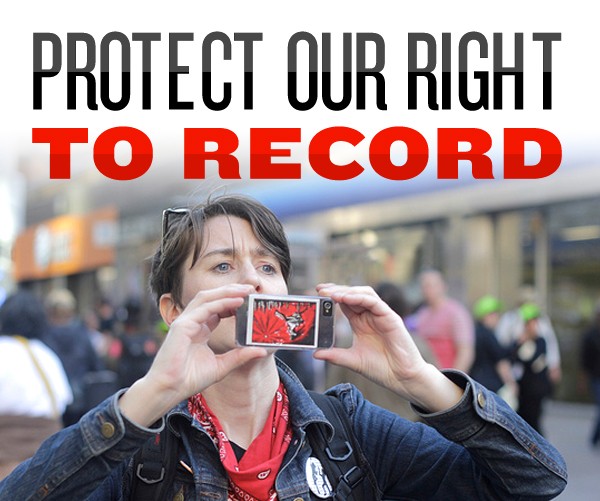
We Must Protect Our Right to Record
Today is World Press Freedom Day — but it sure doesn’t feel like it here in the U.S.
Since September, police have arrested dozens of journalists and activists around the country for the “crime” of trying to document political protests in public spaces.
People using iPhones, Androids and other mobile devices are changing the way we record and share breaking news. In return, police have targeted, harassed — and in many cases, arrested — those trying to capture images and video of public events.

I have documented more than 75 such arrests since the Occupy Wall Street movement began. It has gotten so bad that America’s global press freedom ranking has dropped to a historic low, according to two separate surveys.
This week, Freedom House, an international human rights organization, released its 2012 press freedom rankings, noting that the United States had dropped to number 22 in the world. Earlier this year, Reporters Without Borders revealed that the U.S. had plummeted to number 47 in its press freedom index. Both organizations point to the ongoing assaults and arrests of journalists at Occupy protests as a key factor in the United States’ slipping rank.
Police around the U.S. continue to crack down on bystanders using their phones to record police in public. This Wednesday, two Mississippi teenagers were arrested for using their phones to record police investigating a shooting at their apartment building. Even though the 19-year-olds were recording police activity in a public place, officers stormed into their apartment, handcuffed them and seized their cellphone.
People using smartphones and other mobile devices are changing the way we document and share breaking news. As the media landscape changes, new First Amendment conflicts are emerging on city streets and in the halls of power.
Today Free Press and a coalition of free speech and digital rights groups are reclaiming the First Amendment for the millions who want the freedom to document events in public spaces. We have sent a letter urging Attorney General Eric Holder and the Justice Department to defend our “right to record.” We are asking the public to join us by adding their names.
Whether you’re a credentialed journalist, a protester or a bystander with a smartphone, you are guaranteed freedom of speech, freedom of assembly and freedom of access to information. Your right to document public events must also be protected.
In the letter delivered to Holder, Free Press, along with Access, the American Civil Liberties Union, the Electronic Frontier Foundation, the National Press Photographers Association, the New America Foundation, the Reporters Committee for Freedom of the Press, Reporters Without Borders and Witness, wrote:
“The right to record is an essential component of our rights at a time when so many of those witnessing public protests carry networked, camera-ready devices such as smartphones. Continuous access to the open Internet and social media — over both wired and wireless networks — is also essential.”
Unfortunately, not everyone sees it this way. During the May 1 Occupy protests, at least three journalists were arrested and many more reported rough treatment at the hands of local police. This isn’t an issue specific to one city or one group of protests. This is a national problem that is threatening to undermine one of our core freedoms. Conflicts like this are escalating in cities large and small, and all too often, the First Amendment is caught in the middle.
The Reporters Committee for Freedom of the Press is using World Press Freedom Day to remind journalists and media makers that they must also be advocates for our freedoms. “On World Press Freedom Day — and every day — we must speak out whenever we see or experience the press being stifled,” wrote Executive Director Lucy Dalglish.
The public also has a critical role to play. It is essential for journalists and the public to work together to defend our shared rights and protect our shared freedoms.
Original photograph by Flickr user Timothy Krause
If you care about protecting the First Amendment, please consider a donation to the Free Press Action Fund.